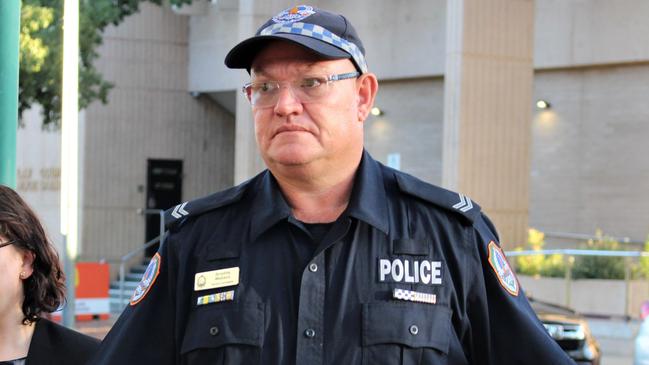Police are being forced to step up amid Territory Government failures, Kumanjayi Walker inquest hears
A leading Northern Territory police officer has told the Kumanjayi Walker inquest legislation should change to ensure police take into account Indigenous cultural laws as part of their duties.
Alice Springs
Don't miss out on the headlines from Alice Springs. Followed categories will be added to My News.
Australian and Territory legislation should be amended to allow police to take into account Indigenous cultural law while performing their duties, a court has heard.
Territory Coroner Elisabeth Armitage is now in the third month of an inquest in the Alice Springs Local Court into the death of 19-year-old Warlpiri-Luritja man Kumanjayi Walker.
Constable Zach Rolfe was acquitted on all charges by a Supreme Court jury in March after shooting Mr Walker three times during a botched arrest in Yuendumu in 2019.
On Thursday, Eastern Arrernte man Senior Constable Brad Wallace - who was not involved in the shooting - continued his evidence after Constable Rolfe was earlier temporarily excused.
Constable Wallace said while some progress had been made in recent decades, in other areas of Australia’s relationship with its Indigenous peoples “we’ve stalled and gone backwards”.

“I think we are where we are now because there’s been, at some level, a multifaceted and multilayered failure from government and non-government organisations in relation to Aboriginal affairs in the NT, and not just the NT but Australia,” he said.
“We’re the only contemporary westernised society in the world that has a First Nation’s population that doesn’t have some recognition (in legislation) in place, and that in itself speaks volumes about where we are in Australia at this point in time.”
Constable Wallace said the failures had left police “ultimately responsible for a lot more social order and justice issues than they should be”, and used as a “stopgap” where there was no other option.
“We find ourselves being part psychologist, part social worker, first-aider, parent, so there’s a lot more that goes into wearing this uniform day to day than what a lot people realise, a lot more stress and a lot more commitment,” he said.
“There’s funded government responses in place to provide all those services but whether they’re available, whether the funding is enough to have people on call on a 24/7 basis.
“But the biggest issue that we’ve got is that we police remote, so policing remote in the NT is unique and most of the time there is no services available other than what you can provide as a member of this organisation, NT Police.”
Constable Wallace said if legislation was changed to allow officers to recognise cultural law, it would allow for more discretion in dealing with Aboriginal people on the job.
“At this point in time there is nothing applicable in place in this nation that allows us as police officers to make that consideration,” he said.
“I do in my role, based upon my understanding and knowledge that I’ve gained through my life, however, at times I could be criticised for taking that path and I’ve had to justify my actions.
“(I think) that is something that needs to be handled on both a Territory and federal government level if there’s going to be change; and do I think there should be? Absolutely.”
The inquest continues.





